#artificial sweeteners
Text

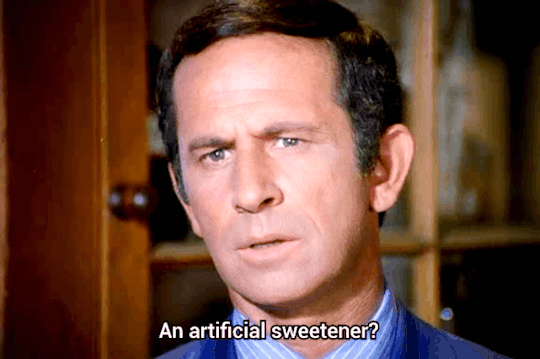


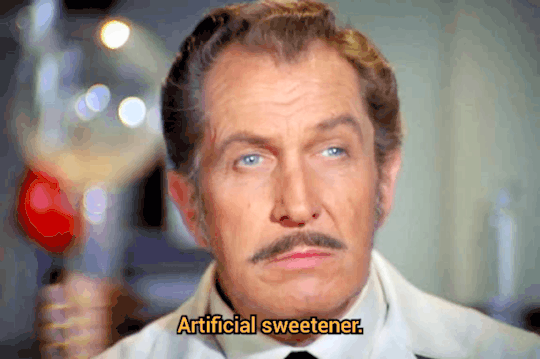
Vincent Price guest stars as Dr. Jarvis Pym
Get Smart; Is This Trip Necessary? (1969)
#vincent price#get smart#don adams#tv show#maxwell smart#funny#sweetener#artificial sweeteners#funny af#i love this 😂#vinny is so sexy#omg#one of his sexiest roles#a mean scientist#yummy#gimme him please#sir!#bicon#bisexual#icon#horror#old horror movies#vintage#movie#actor#handsome#gif#gifs made by me#gifs#vintage tv
218 notes
·
View notes
Text
If you drink diet soda? 🤔
#pay attention#educate yourselves#educate yourself#knowledge is power#reeducate yourself#reeducate yourselves#think for yourselves#think about it#think for yourself#do your homework#ask yourself questions#question everything#do some research#do your research#do your own research#artificial sweeteners
209 notes
·
View notes
Text
Look I appreciate that artificial sweeteners are a useful invention but can they please, please stop putting these in every.single.soft drink? I'd like to occasionally be able to get a soda I don't hate without having to closely check all the ingredient lists.
(I don't mind drinks having less sugar actually just stop replacing it with artificial sweeteners. I'm one of those people who always can taste the aspartame or sucralose or whatever and it tastes cloying and awful to me."Need to rinse my mouth asap" bad.And it's Everywhere now.I used to be able to avoid it by not drinking anything "light" or "zero" or "low calorie" but not anymore)
#lemme guess the sweeteners are cheaper than sugar yes?#food#artificial sweeteners#soda#pepsi changed arizona changed plain Schweppes tonic changed ugh#thank god for asian grocery stores#soft drinks
72 notes
·
View notes
Text
Be me.
Find a flavor of bagels at the grocery store and get very excited, Hawaiian Bagels. Well I love a Kings Hawaiian brand roll so a bagel would probably be amazing, even if its a cheapo Kroger brand approximation.
Buy bagels. Happy Skipping Leo dot Gif.
Slather 5 in wads of cream cheese and runny fried eggs, and consume happily. All that lovely mouth-coating fat hides an ugly truth. I am blissfully ignorant.
Bagel 6 breaks the mold and gets a thin layer peanut butter.
Finish up my bagel. Scroll reddit for a while until I notice a funny flavor lingering in my mouth. A chemically, plasticky, flat flavor - like the sourness that remains after finishing a breathmint, but not quite as sharp and funky. A flavor like sucralose. A hunch takes shape.
A giant red flag labeled SHRINKFLATION waves in my brain.

Skeptical Fry dot Gif
Dig the bag back out of my Bag O Bags™️, read deep into the ingredients
Ingredient 22 of 30: sucralose

Cool, now I'm annoyed and frustrated and its 100% not my fault that I didn't think to check if there was a zero calorie sweetener in these regular-ass full-everything 260-calorie bagels. (Actually 260cal is a little low, which should have been a giveaway but I don't track calories so, again, I don't think to read calorie content labels.) My mouth tastes like plastic even though I am still drinking coffee and I have to go get READ THE INGREDIENT LABELS ON EVERYTHING BEFORE YOU BUY IT tattooed across the back of my hands because I can't ever remember to check for ingredients that should not fucking be in the food I'm carefully selecting to avoid those ingredients.
WHY DO YOU HAVE TO RUIN EVERYTHING, DIET CULTURE INDUSTRIAL COMPLEX, WHY.
#shrinkflation#hidden ingredients#artificial sweeteners#zero calorie sweeteners#diet culture#sensitive palate#supertaster#actually audhd#just neurodivergent things#actually neurodivergent#actually autistic#actually adhd#sensory#sensory sensitivity
5 notes
·
View notes
Text
I can’t be the only person in this world who thinks artificial sweetener isn’t sweet at all. That shit is so bitter. Literal gag.
2 notes
·
View notes
Text
Effects on sugar levels & insulin: 7 most common sweeteners
Aspartame: The oldest and most studied sweetener, aspartame has zero grams of sugar and won’t spike insulin levels after it’s consumed. However, studies in mice have shown that aspartame affects gut bacteria in ways that could lead to insulin resistance, especially with frequent and repeated use. Aspartame is found in diet coke, as well as the brand name sweetener Equal.
Saccharin: Found in Sweet N Low, saccharin may affect gut bacteria in ways that could lead to insulin resistance, based on mice studies. If this is an issue in humans, it will likely only occur with frequent and repeated use. In the past, saccharin has been associated with bladder cancer, based on mice studies, but that was based on extreme levels humans would never consume, so that fear is not based on reality.
Sucralose: A recent human study found that sucralose, which is found in Splenda, may lead to increased insulin spikes when sugar is consumed. It’s also been shown to alter gut bacteria in mice.
Stevia: A relatively new sugar substitute, Stevia is considered one of the safer sugar substitutes. However, little research has been done on it.
Erythritol: This is a sweetener that’s only been approved on the market since 2001, and becoming more popular in recent years. It isn’t recognized as sugar in the body hasn’t been shown to raise insulin levels and is well tolerated, compared to its cousin malitol. That said, it hasn’t been well studied.
Xylitol: Xylitol is a sugar alcohol with about 40% of the calories of regular sugar, so it can contribute to insulin resistance and Type II diabetes if consumed in high amounts.
Maltitol: Maltitol is a sugar alcohol with fewer grams of sugar than pure sugar. But at around half the calories of sugars, it’s not a good option for avoiding insulin resistance and Type II diabetes. It can also lead to significant diarrhea and bloating issues.
source: imaware
#artificial sweeteners#stevia#xylitol#maltitol#aspartame#Saccharin#Sucralose#insulin#blood sugar#diabetic#diabetes#insulin response#imaware#Erythritol#i know these aren't good for you either#they're mostly chemicals#but sometimes you need something
7 notes
·
View notes
Text
Sucralose aka Splenda Is Genotoxic | June 2023
Me: Big Food sells us low quality at high prices that makes us gradually sicker then Big Pharma sells us high priced meds to control the symptoms until we need Big Hospital and a funeral. Think I'm exaggerating? Read on.
"When we exposed sucralose and sucralose-6-acetate to gut epithelial tissues—the tissue that lines your gut wall—we found that both chemicals cause 'leaky gut.' Basically, they make the wall of the gut more permeable. The chemicals damage the 'tight junctions,' or interfaces, where cells in the gut wall connect to each other.
"A leaky gut is problematic, because it means that things that would normally be flushed out of the body in feces are instead leaking out of the gut and being absorbed into the bloodstream."
"We found that gut cells exposed to sucralose-6-acetate had increased activity in genes related to oxidative stress, inflammation and carcinogenicity,"
"To put this in context, the European Food Safety Authority has a threshold of toxicological concern for all genotoxic substances of 0.15 micrograms per person per day," Schiffman says. "Our work suggests that the trace amounts of sucralose-6-acetate in a single, daily sucralose-sweetened drink exceed that threshold. And that's not even accounting for the amount of sucralose-6-acetate produced as metabolites after people consume sucralose."
Harvard says:
"Some studies show that leaky gut may be associated with other autoimmune diseases (lupus, type 1 diabetes, multiple sclerosis), chronic fatigue syndrome, fibromyalgia, arthritis, allergies, asthma, acne, obesity, and even mental illness."
Splenda.com says:
"Today, the Splenda brand is the most recognizable and iconic low-calorie sweetener brand in the world, having sold more than 100 billion yellow packets since its launch in 1992."
Michael Zeece, in Introduction to the Chemistry of Food, 2020 says: "Granulated sucralose is mixed with fillers to provide a measure for measure substitution with table sugar (sucrose). The powdered form of sucralose contains 90% bulking agents such as maltodextrin, that are a metabolizable form of carbohydrate. A 50/50 mixture of sucrose and sucralose, plus a bulking agent, is available for baking applications. This mixture reduces caloric content and enables browning reactions in baking applications." Source
Me: Wow. Ok. 50/50 sugar/Splenda plus bulking agents for baking. Would that mean commercial baking? Processed foods? YES!!!
"Sucralose is also highly stable at elevated temperatures that are often used in food, beverage, and drug manufacturing processes so that product sweetness levels can be maintained following cooking, baking, and/or pasteurization. Sucralose also has excellent stability in low-pH products so that sweetness degradation is not a determining factor in the shelf-life of such products."
FDA says "Sucralose is a general-purpose sweetener found in various foods, including baked goods, beverages, chewing gum, gelatins, and frozen dairy desserts."
By weight, Sucralose is about 600 times sweeter than sucrose (sugar).
Me: Even if I don't buy or use Splenda or drink diet sodas there is a good chance that I'm still eating more than 0.15 micrograms of sucralose in "shelf stable" cookies, pastries, bread or ice cream. Big Food cuts in Sucralose/Splenda because it gives big sweetness and probably costs less than natural sugar/sucrose.
The FDA approved it for general use in 1999. They suggest it for diabetic people! No wonder Celiac Disease, Crohn's disease, and irritable bowel syndrome have steadily increased.
Never mind the Leaky Gut diseases or the malignant tumors, Splenda is calorie-free. /facepalm
#chemical sugar#sucralose#artificial sweeteners#splenda#inflammatory disease#leaky gut#cancer#processed food#big food#they are trying to kill us#2023#diabetes
3 notes
·
View notes
Note
I saw your tags of the Diet Coke and Destiel meme. I’ve been off of sugar completely (aside from natural fruit sugars and even then mainly only red skinned fruit) for about 8 years now and I’ve been hearing a lot that Stevia actually isn’t all that wonderful for you either. It’s still considered to be better, but I’d be cautious with how much you use since there have been some studies done about the effects it has on gut health.
Another alternative that can be used is Monk fruit. I don’t know for sure if you can find versions of it at the store that doesn’t have a bunch of erythritol added to it. But as far as I’m aware, there hasn’t been any evidence that is in support of it causing any sort of harm, unlike stevia.
Hey, thanks! Yeah I have to avoid too much sugar as well given my weight and family history of diabetes so its a pain because I have a sweet tooth.
I didn't know that stevia had any concerning elements to it so thanks for the heads up. Ill look into it. I guess my view is everything in moderation because at the end of the day, anything in excess can cause huge health problems. Heck, that post is about carcinogens and yet doesnt mention that the biggest carcinogen of them all is oxygen. OXYGEN. The stuff we need to breath and live!
So i try not to worry about carcinogens too much because at the end of the day, cancer is an evil bitch that will get 1 in 2 or 50% of us in our lifetimes. We just gotta hope that the type we get will be easily treated.
I will look into monk fish though. Thanks!
2 notes
·
View notes
Text
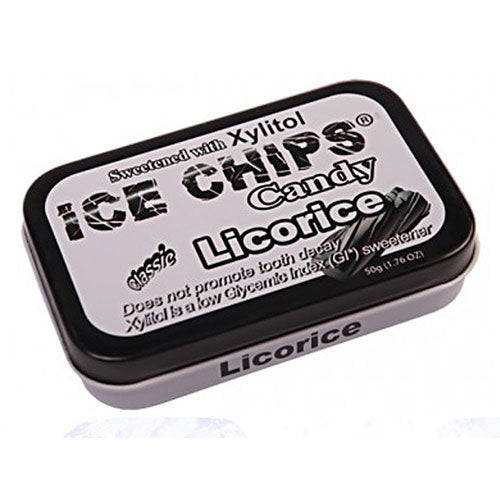
Warning :
Do not eat these, they're actually laxatives .
I do not know why they're being advertised as candy, and why there's no warnings, but stay away from these
5 notes
·
View notes
Text
Low Calorie Sweeteners From Sugar Free India Are The Smart Choice To Sugar And The Best Sugar Substitute. Approved By WHO Which Is Perfect For Diabetics And Health Conscious People.
1 note
·
View note
Text
What Do Artificial Sweeteners Do To Your Gut

Artificial sweeteners are widely used as sugar alternatives in a variety of meals and beverages, but their impact on gut health has prompted concerns. Some of the most common artificial sweeteners are aspartame, sucralose, saccharin, and stevia. According to research, artificial sweeteners can disturb the balance of microorganisms in the stomach, reducing digestive function.
Artificial sweeteners have been found to promote the proliferation of bacteria linked to metabolic disorders such as obesity and diabetes. Furthermore, artificial sweeteners have been related to stomach problems like bloating, gas, and diarrhea. They may also damage the body's capacity to control blood sugar levels, resulting in insulin resistance and metabolic disorders.
0 notes
Text
Impact of Sugar Substitutes on Dental Health : Common Myths
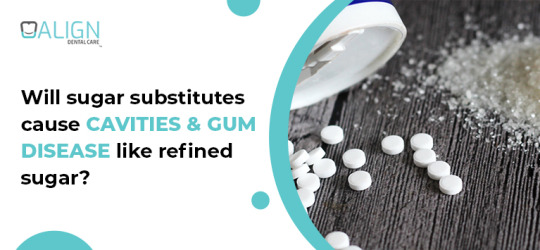
Sugar substitutes, also known as artificial sweeteners, are widely used in various food and beverage products. They are often marketed as a healthier alternative to refined sugar due to their calorie-free and non-nutritive properties. However, there is ongoing debate and confusion regarding the impact of sugar substitutes on dental health, particularly in relation to cavities and gum disease.
In this article, we aim to provide clarity on this issue by addressing common myths and misconceptions about sugar substitutes and their effects on oral health.
Myth: Sugar substitutes do not contribute to tooth decay and gum disease.
Fact: While it is true that sugar substitutes do not provide a food source for oral bacteria, they can still contribute to tooth decay and gum disease indirectly. Many sugar-free products, such as soft drinks and candies, are acidic in nature. These acidic compounds can wear down tooth enamel over time, making the teeth more susceptible to cavities and gum disease. Additionally, some sugar substitutes, such as xylitol, can increase saliva production, which can help neutralize acids in the mouth and reduce the risk of cavities.
Myth: Sugar substitutes are completely safe for dental health.
Fact: While sugar substitutes are generally considered safe when consumed in moderation, some studies have suggested a potential link between certain sugar substitutes and adverse effects on dental health. For example, research has shown that the artificial sweetener aspartame may increase the risk of tooth decay and gum disease in some individuals. It is important to note that more research is needed to fully understand the long-term effects of sugar substitutes on dental health.
Myth: Sugar substitutes can be used as a substitute for oral hygiene practices.
Fact: While sugar substitutes can help reduce the risk of cavities and gum disease, they should not be used as a substitute for good oral hygiene practices. Brushing and flossing regularly, along with regular dental check-ups, are essential for maintaining optimal dental health. Additionally, consuming a balanced diet and avoiding excessive consumption of acidic and sugary foods and beverages are important for protecting the teeth and gums.
In conclusion, while sugar substitutes can be a useful tool for reducing the risk of cavities and gum disease, they should be used as part of a comprehensive approach to oral health that includes regular oral hygiene practices and a healthy diet.
To know more in detail, visit: https://www.aligndentalcare.lk/will-sugar-substitutes-cause-cavities-gum-disease-like-refined-sugar/
0 notes
Link
CPL's daily case study on tumblr.... CPL Business Consultants provided strategic insights and fact-based analysis on the worldwide markets for high-intensity sweeteners (HIS).
0 notes
Text
Fact-Check: Truth About Artificial Sweeteners and Weight Loss
Fact-Check: Artificial sweeteners, often used as sugar substitutes, are a subject of ongoing debate and research in nutrition science. A prevalent claim is that these sweeteners aid in weight loss by offering a low-calorie alternative to sugar. This article examines current scientific evidence to assess the validity of this claim.
Photo by Total Shape on Pexels.com
The Rise of Artificial…

View On WordPress
0 notes
Text
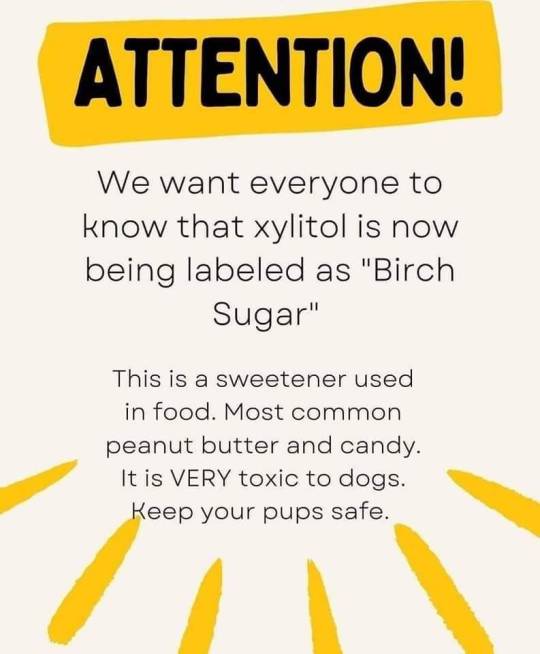
XYLITOL IS NOW CALLED "BIRCH SUGAR." IT WILL KILL YOUR DOGS.
Probably make your other pets sick, too. Xylitol is in lots of sugar free and low calorie foods now. It will not say xylitol or birch sugar on the front or anything, you have to look in the ingredients.
This is peanut butter, gum, candy, drinks, and mints marked "for dry mouth."
Check your wrappers. As every Actual Autistic can attest, companies will randomly change a formula and just not tell anyone. Check them often, even if you're used to that thing.
0 notes